




 |
 |
 |
 |
 |
A quick word before we proceed... The Colossus Project has become a long-running collaboration between The Finnish Progressive Music Association and Musea Records, where several bands are asked to write a piece to fit a concept and to record it using only '70s equipment or soundalikes. Now, even speaking as someone who runs a website devoted to the Mellotron, this smacks of serious 'gear fetishism' to me; OK, make the pieces 'trad', but why mention Rickenbacker basses? More first-wave prog bands played Fenders than Rickys, although I'm with them on 'no digital synth sounds/drum machines etc.' Almost every title released to date features the Mellotron somewhere, if only in sampled form; you'll find the 'sample-only' titles at the bottom of the page.
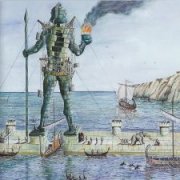 |
The Colossus of Rhodes: The 7th Progressive Rock Wonder (2005, 156.28) ***½/T |
|
| Leviathan: A Thought is Always Free Greenwall: The Secret Passage Sinkadus: God of Silence Mad Crayon: Like the Wind I Will Come Back |
Velvet Desperados: Lords & Knights Revelation: A New Dawn |
|
Current availability:
Mellotrons used:
The Colossus of Rhodes: The 7th Progressive Rock Wonder is the third collaborative project between Colossus, The Finnish Progressive Music Association and Musea Records, where several bands are handed a remit and told to write a lengthy epic to fit, using only '70s equipment, or (note the 'or') reasonable facsimiles thereof. Contrived? You bet. I'm not saying you can't produce decent music this way, but the odds are surely against producing anything from the heart, as the bands concerned struggle to shoehorn their style into the format. In this particular case, six bands were asked to contribute, three of whom I've never even heard of before, although kudos to both organisations for encouraging new progressive talent in this way. The music is actually pretty decent, although every track is rather longer than it really needed to be and I have absolutely no idea how any of them fits the concept of one of the seven wonders of the ancient world, or indeed, the Colossus itself, despite the plot summaries on the Colossus website.
Of the six 'suites', Greenwall's The Secret Passage is the most adventurous, utilising male and female vocals singing in both Italian and English and chopping drastically between styles, while still managing to write a (relatively) cohesive piece of music. Possibly the best piece of music here is from unknowns Velvet Desperados (the only Finnish band present) with Lords & Knights, despite its unnecessary blues section halfway through. As pointed out in several online reviews, Italy's Revelations (nothing to do with the dodgy late-'90s UK band) are unadventurous neo-prog, making a mockery of one reviewer's assertion that their (grotesquely overlong) track sounds like a Selling England... outtake. Er, hello? As far as Mellotron use goes, Sinkadus get plenty in on God Of Silence, probably real, as you can hear a note choke off at one point. I'm deeply unconvinced by the strings on Mad Crayon's Like The Wind I Will Come Back, however lush they sound and the strings and choir on Revelations' A New Dawn are almost certainly samples.
See: Sinkadus
 |
Dante's Inferno: the Divine Comedy, Part I [Discs 2 & 3] (2008, 120.14) ***½/T |
||
| Court: Anastasius Epitaph Willowglass: The Crossing Wicked Minds: Blood From the Trees Brighteye Brison: Capaneus Matthijs Herder: Brunetto Garmond: Canto XVI |
Ars Nova: Demon's Forest Il Castello di Atlante: Malebolge Groovector: Ainiaan Erhe Consorzio Acqua Potabile: La Danza dei Contrari Ozone Player: Inferno XXI Sinkadus: Stuck in Hell |
Viima: XXIII Notabene: La Profezia Entrance: Serpientes Advent: Canto XXVI - The Evil Counselors Contrappunto Project: Guido Da Montefeltro |
|
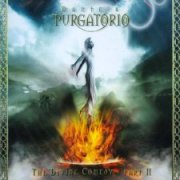 |
Dante's Purgatorio: the Divine Comedy, Part II [Disc 3] (2009, 64.51) ***½/T |
|
| Entrance: Canto XVIII: Luna Maxwell's Demon: Canto XIX: Avarice Atoned RAK: Canto XX: The Verse Continues Colossus Project: Canto XXI Matthijs Herder: Canto XXII: Honey & Locusts |
Mad Crayon: Canto XXIII: Is it This the Price for the Redemption? Tabula Smaragdina: Canto XXIV: A Varasz fa Alatt Blank Manuscript: Canto XXV: Purgatorio Lady Lake: Canto XXVI: Som de la Scalina |
|
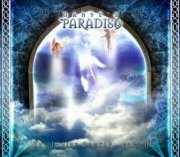 |
Dante's Paradiso: The Divine Comedy, Part III (2010, 261.32) ***½/TT |
||
| Marco Lo Muscio: Intro: The Celestial Way - Towards the Paradise Little Tragedies: Canto I Nuova Era: Canto II Greenwall: Quel Mare Al Qual Tutto Si Move Matthijs Herder: Longing Nexus: El Secundo Reino Brighteye Brison: Under Ornens Vingur The Redzen: Alexa in the Cage Tommy Eriksson: Falling Into Bliss Posto Blocco 19: L'Ultima Acqua Oracle: Kings of the Future Past Faveravola: Del Francescano Sole |
Armalite: Il Cerchio, la Luce e la Virtù Groovector: Houkutja Kuninkaat Roz Vitalis: Canto XIV De Rossi & Bordini: Dentro la Cerchia Antica Echoes: Nel Cerchio di Luce Jaime Rosas: Cruz del Sur Kbridge: Canto XVIII Simon Says: The Needle's Eye Colossus Project: In the Eye of the Eagle Ozone Player: Canto 21 Jinetes Negros: A Li Occhi Belli Blank Manuscript: Living Star |
Nemo: Sans Voix Daal: Static Stars Matthijs Herder: Sacratus Mist Season: Defending Hands Kotobel: Canto XXVIII Tabula Smaragdina: Angyal Raimundo Rodulfo: El Sol de Sus Ojos Flamborough Head: Labyrinth of Light Lady Lake: Miserere Mei Yesterdays: 33 Marco Lo Muscio: Outro Atlantis1001: Conclave Deorum |
|
Current availability:
Mellotrons used:
Dante's Inferno: the Divine Comedy, Part I is the latest multi-artist, multi-disc concept effort from Colossus/Musea, featuring the usual problems with the seemingly endless series. One problem they've avoided this time round is the 'tracks must be around twenty minutes' one, thankfully, as its artificiality doesn't always make for the best music. The trouble with this set, as with most of its brethren, is that it's the equivalent of six forty-minute albums in one hit, which is a bit much. I mean, imagine ploughing through the Gabriel-era Genesis canon in one go, assimilating all that complex music and trying to make sense of it all over the course of a long evening. It's a bit like that.
The quality of the material is generally high, however, with no unpleasant neo-prog clunkers to spoil the flow (Little Tragedies' Canto III is especially dynamic), although the bulk of it's as derivative as most modern prog; I mean, how much more can there be left to say in even a genre where almost anything goes? Of course, the whole format of the series is that anything doesn't go, leaving the bulk of the material here sounding like exactly what it is: copies of '70s prog. Sometimes good copies, but copies nonetheless. Don't get me wrong; it's a very pleasant listen, warbling away in the background, but if I concentrate too hard on it, a sense of 'been there, done that' settles gently over me like an old duvet and I start wanting to hear something a little more innovative.
On an initial listen, you'd be forgiven for thinking that almost every track features the mighty Mellotron. However, I'm quite certain most of them are samples, so unless I'm much mistaken, the only real, tape'n'springs Mellotrons are provided by Matthijs Herder (of Oceana Company), with mucho flutes, strings and choirs all over his highly melodic contribution, Brunetto, plus heavy string and flute use by Sinkadus, although whether they're actually using a real machine (I don't believe they own one) is debatable. The rest of the artists who've definitely used a real Mellotron at some point (Lady Lake, Brighteye Brison and Simon Says) all appear to be using samples this time round, some better than others, some of the more impressive sample users being Willowglass (unsurprisingly) and Armalite, although none of the clones sound like the rubbish that we got in the latter half of the '90s.
It seems Colossus couldn't get enough of their Dante, following up with another four-disc set, Part II, Dante's Purgatorio. Content-wise, it's pretty similar to Part I, even down to many of the participating artists, the bulk of the tracks being (loosely) symphonic prog, with outcroppings of the more neo- end of the spectrum, notably Flamborough Head, Yesterdays and Tommy Eriksson's rather dull The Stream Of Hope and some near-metallic efforts, not to mention the several bands who obviously feel that ELP are still worth emulating (were they ever?). Highlights include Soulengine's frenetic Polheim, Maxwell's Demon's Avarice Atoned and Matthijs Herder's Honey & Locusts, although the bulk of the set's contents are far too bombastic and generic for their own good, sounding like no better than a pastiche of the style. On the Mellotron front, there's plenty of Mellotron samples, particularly the major string and choir use on KBridge's A New Journey/The Helmsman, although, as far as I can ascertain, the only genuine Mellotron parts here are the choir and strings on Maxwell's Demon's contribution and the major choir, flute and string parts on Matthijs Herder's.
Bejasus, there's a third one! 2010's Dante's Paradiso: The Divine Comedy, Part III is, well, a lot like its two predecessors, many artists returning for a second, or even third time. The format of the set is identical, thirty-six pieces, mostly in the six- to nine-minute range, covering various progressive styles, Little Tragedies ripping ELP humungeously, while Greenwall shift into gospel mode, Armalite choose to channel Marillion, for reasons known only to themselves, Jaime Rosas starts off opting to combine indie and prog (no, it doesn't work), not to mention Jinetes Negros' mad operatics. Lady Lake, however, seem to've captured the sound of their '70s forebears better than anyone else here, complete with a loping 6/8 part of the kind no-one plays any more. Once again, loads of sampled Mellotron, a handful of 'definitely reals' and several 'not sures': Matthijs Herder sticks M400 flutes, choirs and strings all over the gentle Longing and the less gentle Sacratus (there's even a pic of his machine in the booklet), Alfio Costa adds strings to Daal's Static Stars and The Colossus Project's In The Eye Of The Eagle, Dániel Krivánik's strings and flutes on Tabula Smaragdina's Angyal actually sound pretty authentic, although I'm not convinced by De Rossi & Bordini's Gianluca de Rossi's contributions.
I feel I've been a bit harsh here, but listening to these is like eating an entire packet of chocolate biscuits in one go, or watching your favourite trilogy of films one after the other, or maybe both at once. Just too much. I suppose one strength of these various artists sets is that no one group of musicians is overstretched in the creativity department, keeping the ideas relatively fresh. For future reference, though, if I'm going to tackle these vast, sprawling sets, I'll do them a disc at a time, at most; it's not so bad when the music's familiar, but this much new stuff can leave the listener with musical indigestion. Loads of Mellotron sounds, too, but I suspect very little real Mellotron.
See: Sinkadus | Maxwell's Demon | Daal
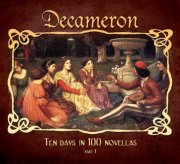 |
Decameron: Ten Days in 100 Novellas, Part 1 [Disc 3] (2011, 55.55) ***½/T |
|
| Roz Vitalis: Eight Tale Rhys Marsh: In Deceit They Play Inner Drive: Second Day - Tenth Tale Trion: Fast Forward Attilio Perrone: Peste Amami |
Contrarian: The Alchemist The Samurai of Prog: The Promise Jukka Kulju: Deacmeron Day Three - Tale Six |
|
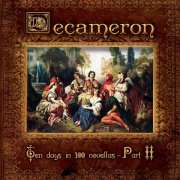 |
Decameron: Ten Days in 100 Novellas - Part II [Discs 2 & 3] (2014, 136.52) ***/T |
||
| The Samurai of Prog: Sweet Iphigenia Steve Unruh: Carapresa's Tale Ars Ephemera: Lost and Found The Rome Pro(G)ject: Tale 4 Orchestra d'Oblio: Neifile King of Agogik: Damsel's Love and King's Wrath |
Marchesi Scamorza: La Sooria di Teodoro l'Armeno Prima Schiavo Poi Liberto d'Amore Playing the History: Nastagio degli Onesti Senogul: Ninth Tale Camelias Garden: Quinto Giorno/Decima Novella Rhys Marsh: The Tales That You Tell Narrow Pass: Tale 2 |
Mauro Mulas: Tale 3 La Bocca della Verità: Chichibio Faveravola: Dell'Amore di Gianni da Procida e Restituta Bolgaro Trion: Sixth Tale La Théorie des Cordes: Nouvelle VII: La Femme Adultère ou la Roi Réformée Jaime Rosas & Rodrigo Godoy: Creer, Crecer |
|
Current availability:
Mellotrons used:
Terrifyingly, 2011's Decameron: Ten Days in 100 Novellas, Part 1 is presumably but the first of three multi-disc sets, given that the original Decameron consists of a hundred stories and this set only covers the first third. What can I say? It's another huge, unwieldy Colossus set, a literary concept shoehorned into a series of unrelated, mostly instrumental pieces by some currently active progressive bands, or is it vice versa? As usual, plenty of good material, including Posto Blocco 19's Scandendo Il Tempo, Roz Vitalis' Eighth Tale, Rhys Marsh's In Deceit They Play, Trion's Fast Forward, The Samurai of Prog's The Promise, Ars Ephemera's Decameron 3:7 and Marco Lo Muscio excellent church organ piece that ends the set. Downsides? Too many cod-Celticisms, while Attilio Perrone's unpleasantly neo- Peste is a lowpoint, but aside from a handful of rather clichéd efforts, the quality is generally fairly high.
Plenty of Mellotron samples, but I suspect we're only hearing a mere two genuine articles here; someone (Marsh himself?) adds strings and cellos to Rhys Marsh's In Deceit They Play and Alfio Costa adds a brief flute part to The Samurai of Prog's The Promise, though not to Daal's contribution. Once again, if you're a fan of these multi-artist sets, you'll almost certainly find plenty to like here, but too much filler and a ridiculous four-hour running time makes it hard going for many of us.
The second instalment in the saga, Part 2, is the usual mixed bag, probably at its best on The Samurai of Prog's Sweet Iphigenia, Playing the History's Nastagio Degli Onesti and Narrow Pass' folky Tale 2, while Steve Unruh's overly-literal Carapresa's Tale is funny for all the wrong reasons. One definite and one probable Mellotron track: Playing the History's Marco lo Muscio sticks obviously genuine Mellotron strings onto Nastagio Degli Onesti, choirs further in, while Rhys Marsh's The Tales That You Tell has what appear to be more of the same. Plenty of fakeotron, too, some of which is credited as if it were real. Yes, you, Nexus. And Serdimontana. And Willowglass. And about two-thirds of everyone else. Once again, a four-plus hour set, featuring far too much filler for its (and our) own good. Difficult to wholeheartedly recommend, frankly.
See: Rhys Marsh | The Samurai of Prog | Daal | Marco Lo Muscio
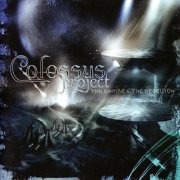 |
The Empire & the Rebellion (2008, 77.41) ***/TTTT |
|
| Astral Prelude Droids The Dark Lord of the Sith Meeting the Force Two Suns When I Was a Jedi The Millennium Quartet The Millennium Falcon |
My Tears for Alderaan The Rebellion Suite May the Force Be With You |
|
Current availability:
Mellotron used:
Has the Colossus Project finally gone too far? I know they've given us concept albums based around films before (notably the several volumes of The Spaghetti Epic), but Star Wars? Are you kidding? Yeah, of course I love the original films (let's not mention the abominable prequels), but a prog concept album based around them? John Williams' magnificent scores for the actual films overshadow any attempts to straitjacket the epic series into any other musical format, prog included. Mind you, better than, say, ska/punk, although Norwegian death metal might do the job. Anyway, back to the point: 2008's The Empire & the Rebellion is one of the few Colossus albums to be written and recorded by committee, rather than being compiled from tracks specifically recorded by a number of bands. There seems to be a core band behind most of the music, consisting of Italian retrohounds Tilion plus a cast of, well, a dozen or so, including members of Arsnova and Glass Hammer, plus the inimitable Cristiano Roversi (Moongarden, Submarine Silence).
Much of the music has merit, although I wouldn't say it's as good as Tilion's work, but I do have one major bone to pick: the vocals. Why didn't they tackle the subject instrumentally? To have someone singing about an imaginary universe is to hover dangerously close to musical theatre, in my book; think: Andrew Lloyd-bloody-Webber's Phantom of the Opera as played by an Italian prog band. Oh, hang on, Fabio Zuffanti's already done that, hasn't he? Anyway, this is rather better than that, as it rarely slips over into full-blown Oklahomaisms, although Meeting The Force cuts it bloody close, I have to say. Oh, hang on, the jazz/blues (!) of The Millennium Falcon (complete with sax solo) jumps the shark big-time, especially with its cheeso chorus. I take it all back.
Tilion's Alfio Costa gets his Mellotron in all over the place, I'm pleased to say, with string, flute and choir parts to be heard on most tracks, plus brass on the 'side long' The Rebellion Suite, making for a Mellotron-heavy album, albeit probably Colossus' least good to date, despite also being one of its shortest.
See: Tilion
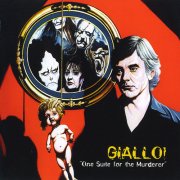 |
Giallo! One Suite for the Murderer (2008, 74.57) ***½/TTAlfio Costa:Frammento Rosso (Intro) Dark Session: Visions of Helga Leviathan: Vecchi Giochi Floating State: Suite dall'Inconscio dell'Assassino Alfio Costa: Mirrors (Outro) |
Current availability:
Mellotron used:
Giallo! One Suite for the Murderer is another film-themed collection from the Colossus Project, this time based on Dario Argento's iconic Deep Red, a.k.a. Profundo Rosso, from 1975, originally soundtracked by the mighty Goblin, of course. As with most Colossus releases, the single disc contains three 'side long' tracks, this time bookended by brief piano pieces by Tilion's Alfio Costa. Apparently a Tilion side-project, Dark Session's Visions Of Helga is probably the best thing here, the band being very aptly named, while Leviathan's Vecchi Giochi is a bit on the neo- side and although Floating State's Suite Dall'Inconscio Dell'Assassino has come great instrumental sections, it's rather let down by the vocals.
Although there's no Mellotron on either of Costa's solo tracks, he plays great swathes of the thing on the Dark Session piece, opening with very obviously real strings (well, real Mellotron - oh, you know what I mean), switching to flutes within the first minute. It's SO nice to hear someone actually playing real Mellotron on one of these albums, given the preponderance of samples on most of them... Anyway, neither Colossus' best nor worst, but worth hearing for the Dark Session track, if nothing else.
See: Tilion
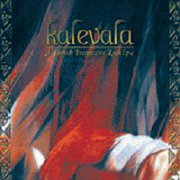 |
Kalevala: A Finnish Progressive Rock Epic (2003, 238.11) ***½/T½ |
||
| Haikara: The Creation/The Sowing Overhead: Wainamoinen and Youkahainen/ The Fate of Aino Simon Says: Som Floden Flyter Sinkadus: Trubadurens Kval Moongarden: Maiden of the Bow Il Castello di Atlante: Ilmarinen Forges the Sampo Magenta: Lemminkainen's Lament Submarine Silence: The Three Battles Metaphor: Raking the Bones Clearlight: The Boat Builder/Searching for the Lost Word |
Orchard: Ilmarinen's Wooing Greenwall: The Wedding Revelation: Uninvited Guest Scarlet Thread: Pimeästa Pohjolasta Mad Crayon: Il Suono dei Ricordi Museo Rosenbach: Fiore di Vendetta Leviathan: Filo di Lama Malibran: Strani Colori Sofia Baccini: Malvagio per le Stelle Elegant Simplicity: Ilmarinen's Bride of Gold Qadesh: Ilmarinen's Fruitless Wooing |
Cantina Sociale: Kantele Grand Stand: Stormen Germinale: La Battaglia per il Sampo Aardvark: Uusi Kantele Thønk: Kapittu 45/46 Groovector: Tuletta Whobodies: Pine Randone & Tempore: Runo 49 Cafeïne: The Way is Open [Bonus track on reissue: Viima: Kaukomielen Kaipaus] |
|
Current availability:
Mellotrons used:
As mentioned above, 2003's Kalevala: A Finnish Progressive Rock Epic is the first Colossus title. While not the longest, it's a full-length three-CD set, so be prepared to put a few hours of your life to one side.
The Kalevala is Finland's great mythological epic, so I suppose it's a reasonable starting point for the series, given its constraints; back in the 'real world', it's a thoroughly ludicrous and pretentious idea, but this is the World Of Prog, where anything can happen. Sort of. As with most 'inspired by' albums, I'm not entirely sure why much of this music reminds the writers of a poem within the epic, but it's produced some pretty decent stuff, so I don't feel inclined to argue too much. Greenwall are a new name to me, but have produced one of the most original tracks here, while the wonderful Qadesh (seen once, never forgotten) are certainly the most off-the-wall band on the album; their inclusion proves that Colossus are light years ahead of, say, Mellow Records in their choice of project contributors. Another original approach is taken by Italy's Germinale, whose entire song is narrated, slightly (and deliberately) out of step by two band members, Marco Masoni and Salvo Lazzara, while the nicest surprise here is the inclusion of Sinkadus, missing presumed dead for several years (their website's front page still has a reference to their excellent 1999 appearance at Progfarm...). There are a few puzzling contributions; why exactly does a jazzy piece like the Whobodies' Pine remind anyone of a Finnish epic poem? And why do the Groovectors feel that copying Pink Floyd is a viable option? Not to mention Magenta's turgid pseudo-'70s neo-prog... At least they stop short of open plagiarism on this track. All in all, some excellent material, a lot of 'pretty good' and surprisingly (and refreshingly) very little 'shouldn't have bothered'.
On the Mellotron front, a clear half-dozen of these bands are known for using samples, so accurate identification of Mellotron use is a little random, to be honest. Simon Says only used the Mellotron on their mid-'90s release and while the strings (from Stefan Renström) on their track, Som Floden Flyter, sound (fairly) genuine, the choirs are muffled and indistinct and reek of sample. Sinkadus' strings and flutes on Trubadurens Kval are nice and upfront and sound real enough and known sample users Moongarden's credited strings and choir sound remarkably similar to the ones used by Simon Says. Related outfit Submarine Silence's samples are good enough to fool the ear, unlike Magenta's, although both are credited with 'Mellotron'. Hmmm. More credited Mellotron, though clearly samples, on Orchard's Ilmarinen's Wooing, as I suspect are Revelations'. The reformed Museo Rosenbach contribute a track that, while not sounding much like anything from Zarathustra, is apparently immeasurably better than anything from their reformation album, 2000's Exit, although the Mellotron is, again, sampled. Sofia Baccini is credited with using one (played by herself, as are most of the instruments on her track), although it's entirely inaudible, with the only obvious strings being from the credited PPG. Randone & Tempore's contributions are most certainly sampled, as are Elegant Simplicity's; you simply can't play Mellotron flutes that quickly, at least, not without considerable key-click issues... Then again, if the remit is to use 'traditional' keyboard sounds, what are most bands to do? Most of the above don't own a Mellotron and most probably don't even have (affordable) access to one, so I suppose you can't blame them for using samples in an attempt to sound 'authentic'.
Basically, there's far too much to take in here at one sitting; its three discs last a gnat's under four hours for Chrissake... There's nothing really painful here, which is a bonus and amongst the 'yeah, not bad's, there are quite a few excellent pieces of music; about enough for a reasonable-length single CD, in fact... I'm not entirely convinced by the reasoning behind the whole concept, but it gives several new bands a chance to display their chops amongst slightly more seasoned campaigners, although I'm not so sure that straightjacketing bands into a fixed format is the way forward, however much I may be in favour of said format. So; how many 'almost definite' Mellotron sightings are there here? Er, one. OK, I've highlighted seven tracks, some of which don't have a Mellotron credit, but I'd be surprised if more than three of the other six are genuine and I wouldn't be completely amazed to discover that there isn't a jot of real tape-replay anywhere on the album. I know it looks like I've highlighted at random, but between the definite and possible samples, it's rather difficult to work out what's going on. Suffice to say, a fair bit of Mellotron work, although little of it is likely to be 'for real'.
See: Sinkadus | Cantina Sociale | Thønk | Viima
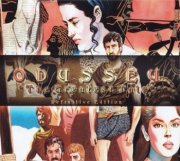 |
Odyssey: The Greatest Tale (2005, 221.32) ***/½ |
|
| Nathan Mahl: Chapter I: Of Longings, Suitors, Deities and Quests... Nexus: Chapter II: El Regreso - The Return Glass Hammer: Chapter III: At the Court of Alkinoos XII Alfonso: From Ismarus to the Land of Death Simon Says: Chapter V: Minds of Mortal Men - Meander Tales |
C.A.P.: Sulle Ali del Sogno Odissea: Libri XIV, XV, XVI Témpano: Chapter VII Minimum Vital: Étranger en Sa Demeure Aether: Chapter IX |
|
Current availability:
Mellotron used:
To be completely honest, I'm running out of things to say about Colossus' monster sets; 2005's Odyssey: The Greatest Tale (quite possibly true) spreads nine artists over three discs and nearly four hours, making for either a) prog heaven, or b) prog hell. Possibly both. Simultaneously. As usual, the restrictive format often produces overlong material with much musical wittering, although most of the bands on this particular release seem able to avoid the 'endless soloing' trap, thankfully. Nathan Mahl's really rather good trad-prog differs noticeably from Nexus' more ELP-ish leanings, while XII Alfonso have a distinctly proto-prog feel to them, although Aether's contemporary-sounding effort is probably the set's weakest contribution. The other twenty minute-plus tracks are all fairly typical for the artists concerned, particularly Simon Says' somewhat second-rate effort.
CAP's Maurizio Venegoni plays the album's lone real Mellotron, opening Sulle Ali Del Sogno Odissea: Libri XIV, XV, XVI with flutes, doubled with real recorder, chordal strings coming in around the nine-minute mark and more strings later on, although there's also quite heavy use of sampled Chamberlin male voices and Mellotron choirs, too. On the samplotron front, there's strings and rather crummy choirs on the Nexus piece, strings from Glass Hammer, strings and (slightly better) choirs from Simon Says, flutes all over Témpano's offering and other bursts of strings and choir, assuming you actually care. Once again, once again... 'Side-long' tracks do not automatically make for great prog - sometimes the complete opposite. There's an excellent single-disc album hidden away here, but it would take a great deal of editing to reveal it.
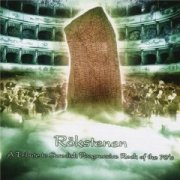 |
Rökstenen: A Tribute to Swedish Progressive Rock of the 70's [Disc 3] (2010, 79.33) ****/T½ |
|
| Richard Marichal & Raimundo Rodulfo Secondo Intermezzo Daal: Var Glad Var Dag (Ragnarök) Pseudo Sun: En av Oss (Life) Anja: Mount Everest (November) The Moor: Grävmaskinen (Pugh Rogenfeldt) Divine Baze Orchestra: Här Kommer Natten (Pugh Rogenfeldt) Matthijs Herder: Two Hours Over Two Blue Mountains... (Älgarnas Trädgård) |
Moosequartet: Vi Valde Inte Våldet (Fickteatern) Darxtar: Cosmic Love (Ralph Lundsten) Pensiero Nomade: Jatten Feeling (Flasket Brinner) In the Labyrinth: Worlds on Fire (Handgjort) Orient Squeezers: Ödet (Zamla Mammaz Manna) Jerry Johansson & Dan Fröberg: Kontinuerlig Drift [bonus track] |
|
Current availability:
Mellotrons used:
The Colossus Project's latest, er, project takes a sharp left turn from their usual 'find a concept, examine it minutely over several CDs with dozens of bands' by, er, doing exactly that, but making it a set of covers of Swedish '70s prog bands by current outfits. The downside? If you've got a decent prog collection, you'll already have much of the source material in its original form. The upside? A guarantee of compositional quality, since all the bands covered are highly-rated and you can be sure that only their best material has been tackled.
As you can see, I've added the original artists above in brackets after the song titles; they include the likes of Blåkulla, Kaipa, Atlas, Trettioåriga Kriget and Dice, plus the lesser-known (within the genre; Bo Hansson is probably the only one known to the public at large) Pugh Rogenfeldt, Fickteatern and Ralph Lundsten. I don't know anything about the selection process, but the quality is extremely high, many of the tracks having that slightly jaunty quality of so much Swedish prog of the time, including the unfamiliar material here. Highlights? Since the versions of familiar material are largely reiterations of the original arrangements, what was the best material then tends to be the best material now, including the Kaipa tracks and, notably, the large chunk of disc 2 containing the whole of Dice's immortal The Four Riders of the Apocalypse (recorded in '77, finally released in '92); to think that this gem could've disappeared into the uncaring maw of history...
Mellotronically-speaking, despite much sample use (notably Simon Says and Willowglass), the only 'definites' I can spot are Tilion's Alfio Costa adding strings to Daal's take on Ragnarök's Var Glad Var Dag, Daniel Karlsson plays very upfront strings on The Divine Baze Orchestra's Här Kommer Natten (Pugh Rogenfeldt), Matthijs Herder (Oceana Company) puts flutes, cellos, strings and choirs onto his solo take on Älgarnas Trädgård's Two Hours Over Two Blue Mountains..., white Peter Lindahl adds some rather background strings (under real ones) to In the Labyrinth's Worlds on Fire (Handgjort, a name totally unfamiliar to me).
Despite my initial reservations concerning the validity of the entire project, were it to only succeed on one level, it would be as an unusual kind of primer to the Swedish '70s scene, collating much of its best material in one place, with largely excellent, if probably rather overly-reverential versions. Mellotronically, although it's mostly samples (usual Colossus insistence on 'period' sounds), four real Mellotron tracks is better than many of these projects. Recommended, though more for the music than the Mellotron.
See: Daal | The Divine Baze Orchestra | In the Labyrinth
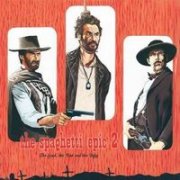 |
The Spaghetti Epic 2: The Good, the Bad & the Ugly (2006, 77.33) ***½/TRandone:The Good La Voce del Vento: The Bad Tilion: The Ugly |
Current availability:
Mellotrons used:
2006's The Spaghetti Epic 2: The Good, the Bad & the Ugly follows on from the first volume, two years earlier (see 'samples', below), utilising three of that album's six bands on a lengthy single-disc effort. Randone do a decent enough job on The Good, cheekily (but effectively) quoting from Morricone's original score, although they meander over its twenty-minute plus length. La Voce del Vento's The Bad is, aptly, the least good track on the set, spoiled by some rather unforgiving vocal parts, leaving Tilion's The Ugly to save the day. Bold, risk-taking and elegant, it's easily the best track here, not really sounding like anybody much else at all, which is a definite bonus.
'Mellotronically' speaking, Randone and La Voce del Vento appear to use passable samples, leaving Tilion as the only real M400-toting outfit on board, their Alfio Costa having bought his machine the previous year, with some decent string work scattered across their track. So; not bad, not great, probably not as good as Kalevala, although it has its moments. Not that much Mellotron, either, excluding samples.
See: Tilion
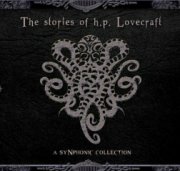 |
The Stories of H.P. Lovecraft: A SyNphonic Collection [Disc 3] (2012, 69.37) ****/T |
|
| Sithonia: Il Gatti di Ulthar Daal: The Call of the Cthulu Kate: Dream-Quest to the Unknown Kadath Nexus: The Colour Out of Space |
Safara: Calendimaggio Aether: Mountains of Madness Goad: At the Mountains of Madness |
|
Current availability:
Mellotrons used:
Along with Edgar Allan Poe (below), Howard Phillips Lovecraft is such an obvious subject for a Colossus set that's it's amazing it's taken them a decade to get round to it. 2012's The Stories of H.P. Lovecraft: A SyNphonic Collection is one of the series' better recent sets, some of the others betraying a slight sense of overall ennui. Opening with The Samurai of Prog's frankly eccentric The Case Of Charles Dexter Ward, I'm obscurely reminded of the nutsoid narration in Todd Rundgren's Utopia's Singring And The Glass Guitar (from 1977's Ra), other notable tracks including Unitopia's vaguely Van der Graaf-ish The Outsider, Simon Says' bombastic The Wailing Wall, Sithonia's 'sinister fairground' feel on Il Gatti Di Ulthar and Kate's suitably eerie Dream-Quest To The Unknown Kadath. Highlights (not necessarily the same thing) include La Coscienza di Zeno's Colofonia (very '70s Italian) and Ars Ephemera's The Other Gods, while D'Accord's The Doom That Came To Sarnath infuriatingly veers between 'brilliant' and 'crap', notably the inappropriate rock'n'roll interludes; say what you will, at least you can't ignore it...
Unsurprisingly, Daal are the only 'real Mellotron' band here, adding what sounds like an amalgam of strings, cellos and flutes to their The Call Of The Cthulu, with samples from Glass Hammer, Simon Says, Ars Ephemera, Ciccada (spot the brass) and Sithonia. All in all, despite a few misses, this is a pretty decent set, especially for fans of the artists concerned.
See: Daal
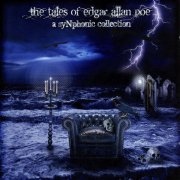 |
The Tales of Edgar Allan Poe: A SyNphonic Collection [Disc 2] (2010, 73.13) ***/T |
|
| Jukka Kulju: The Purloined Letter Anima Morte: The Premature Burial Blank Manuscript: The Gold Bug Areknames: Hop Frog Little Tragedies: The Man of the Crowd |
Armalite: The Murder of the Rue Morgue Chansonoir: Ligeia Magnetic Sound Machine: The Cask of Amontillado Daal: The Fall of the House of Usher |
|
Current availability:
Mellotron used:
2010's The Tales of Edgar Allan Poe: A SyNphonic Collection is probably one of the Colossus Project's less successful sets; too few of its contributors get inside their chosen story in any way, while too many use little imagination, happy to churn out the same old prog clichés ad infinitum. Typical examples include pair of tediously neo- efforts, Jukka Kulju's The Purloined Letter and Armalite's The Murder Of The Rue Morgue (complete with seriously poor vocal harmonies, not to mention their name; I mean, taking your moniker from a gun, simply because it's in a Marillion lyric?), while Jinetes Negros' The Masque Of The Red Death is just plain cheesy. On the upside, Areknames', Chansonoir's and Daal's contributions are all excellent, in their own different ways.
Just the one genuine Mellotron track, as far as I can ascertain (and very few samples, surprisingly), with, variously, brass chords, a flute melody and strings on Daal's lengthy The Fall Of The House Of Usher, from the inimitable Alfio Costa. Colossus have released many more interesting sets than this one; I'd stick with them, if I were you.
See: Daal
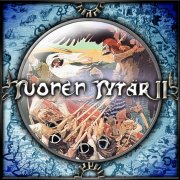 |
Tuonen Tytär II: A Tribute to Finnish Progressive rock of the 70's (2009, 181.16) ****/T |
||
| Jinetes Negros: Atlantis (Nova) The Samurai of Prog: Colossus (Wigwam) B612: Sanaton Laulu (Finnforest) Tommy Eriksson: Cheap Evening Return (Wigwam) Overhead: Vuorellaistuja (Tabula Rasa) Pax Romana: Nobody Never Knows Nothing (Rockressio) Kate: Last Quarters (Tasavallan Presidentti) Trion: Vanha Surullinen (Nova) Willowglass: Fairyport (Wigwam) Contrarian: Lucky Golden Stripes and Starpose (Wigwam) Simon Says: For Her Son (Scarab) |
Cristiano Roversi: Sane Again (Wigwam) Ageness: Praying Stone (Scarab) The Phase: Playground (Kalevala) Jeavestone: Delightful (Kaamos) Tkingdkeys: Gryf (Tabula Rasa) Kumina.Org: Joropo Lianero (Piirpauke) Piece of Cake: Boogie Jungle (Kalevala) Pinnacle: Paikalliset Tuulet (Finnforest) Ons?gen Ensemble: Escape From the Storm (Kalevala) Karmic Jaggernaut: Down to Earth (Made in Sweden) Fauno di Marmo: Gloria Deo (Haikara) |
Ozone Player: Kunnes (Finnforest) Yesterdays: Lost Without a Trace (Wigwam) Scarlet Thread: Tulen Pisara (Fantasia) Mist Season: Pan (Maru & Mikael) Viima: Uuteen Aikaan (Scapa Flow) Equilibrio Vital: Impressions of India (Jukka Tolonen) Stringpurée Band: Koin Siipesi (Finnforest) Kosmos: Takaisin Virtaan (Pekka Streng & Tasavallan Presidentti) Haikara: Yksi Maa - Yksi Kansa |
|
Current availability:
Mellotrons used:
Tuonen Tytär II (Death's Daughter) is possibly the first Colossus tribute album, as against their slightly unwieldy concept efforts, its subtitle, A Tribute to Finnish Progressive rock of the 70's, letting you know exactly what you're getting. Of course, Wigwam tower like a (sorry) Colossus over the Finnish scene, Tasavallan Presidentti and Jukka Tolonen (who has played with both bands) being the next best-known, the rest of the artists covered here being fairly-to-exceedingly obscure. I have no idea what the material selection process is - do artists have complete freedom of choice? - but, as you'd expect, most of the three-disc set's contents are the cream of the era's output, highlights including Jinetes Negros' Atlantis (written by Nova), Willowglass' Fairyport (Wigwam), Pinnacle's take on Finnforest's fusionesque Paikalliset Tuulet and Karmic Jaggernaut's Down To Earth (the non-Finnish Made in Sweden).
Although the set contains seven credited Mellotron tracks, the only 'definites' are Tilion's Alfio Costa's strings and flutes on The Samurai of Prog's Colossus (Wigwam) and Viima's Uuteen Aikaan while Yesterdays' Bogáti-Bokor Akos' strings on the track are clearly nothing of the sort. The same goes for Overhead' Vuorellaistuja, Simon Says' For Her Son, Cristiano Roversi's Sane Again and Pinnacle's Paikalliset Tuulet (with particularly awful choirs). Other sample users include Trion (of course) and Ageness, not to mention several others. For some reason, picking individual highlights from this set is proving surprisingly difficult, as it seem to work better as a set, despite its three-hour length. This is actually a really good primer to Finland's well-kept secret of a prog scene, giving a contemporary sheen to many of its better moments, despite Colossus' (usually thankful) insistence on 'traditional' sounds.
See: The Samurai of Prog | Viima
 |
The 7 Samurai: The Ultimate Epic (2006, 76.10) ***/TTCAP:Alla Corte degli Eroi (1550 - Periodo Sengoku) Témpano: The Farmers Taproban: The Bandits |
Current availability:
Mellotron used:
The best feature of 2006's The 7 Samurai: The Ultimate Epic (really?) is its relative brevity: one disc, albeit a full-length one. It starts well enough, with CAP's seriously Tull-esque Alla Corte Degli Eroi (1550 - Period Sengoku), although while Témpano's The Farmers has the courage to stray some way from the progressive mainstream, I'm not entirely sure it works, with far too much aimless jamming for its own good and Taproban's The Bandits is, frankly, a bit of a mess. Saying that, the latter two pieces definitely have their moments, but as usual, too much filler.
CAP's Maurizio Venegoni plays a 1972 M400, according to the sleevenotes, with a string part a few minutes into Alla Corte Degli Eroi, with more string, choir and flute parts scattered throughout, plus samplotron strings and choirs from Tempano and Taproban, possibly true to the spirit of the era, but not the letter. A decent enough effort, then, although the padding used to fill the tracks out to the 'required' length only diminishes the end result.
The Spaghetti Epic: Six Modern Prog Bands For Six '70s Prog Suites is the second Colossus/Musea collaboration and adds another factor to the mix, namely, 'each suite should be twenty five minutes maximum' which means, in practice, 'each suite will be at least twenty minutes'. The album's premise, however, is a fascinating one; tackle Sergio Leone's famous spaghetti western, 'Once Upon a Time in the West', in long-format, '70s-inspired progressive form. Not your standard prog fare, then... And would you believe that it seems to've brought out the best in some of the bands concerned? Surprisingly, maybe, being forced into a previously-unexplored area has pulled them out of their comfort zone and made them produce something a bit different. On disc one, Haikara's The West exudes a sense of menace, with unusual (but fitting) use of harmonica and while Randone and Tilion's tracks are good, they can't quite match Haikara for sheer invention. La Voce del Vento are, amusingly, British, being a Guy Manning side-project, producing a pretty decent effort in Harmonica. Taproban are reasonable enough, at the heavier end of things, but the much-fêted Trion are, sadly, the dullest thing here; producing a 'side-long' piece of music doesn't just mean 'solo till the cows come home' and their neo-prog tendencies grate somewhat.
Not an awful lot of 'Mellotron', to be honest; Randone, Tilion, Manning and Trion all use samples, as they do (or did at the time) on their regular releases and if you think Taproban's pseudo-Hammond is bad, wait till you hear their voice samples... This has got to be the nastiest, stretched, low-rate sample it's been my displeasure to hear in a long while. Anyway, a good start, but tails off rather; this twenty-minute plus thing only encourages bands to be self-indulgent.
The third (and final?) Spaghetti instalment, 2008's The Spaghetti Epic 3: The Great Silence, is a fine example of how to do these albums properly: a single disc, three dynamic bands and some good, energetic material that actually at least vaguely illustrates the subject matter. Little Tragedies keep the energy up throughout The Voice Of Silence, the 'medieval' section in Yesterdays' Suite Pauline is particularly good (if not very Spaghetti Western), while N.O.T.'s Epilogo is no slouch, either. Yesterdays and N.O.T. both uses Mellotron samples, with clearly sampled strings and choirs on the former and more strings and flutes on the latter.
2007's Treasure Island (subtitled by Robert Louis Stevenson) is, thankfully, restricted to a single disc, which, if nothing else, reduces the chances of anything really dodgy getting through. In fact, all three contributing bands do a pretty decent job, not only of the actual music, but also in their attempts to make their pieces relevant to the tale itself, notably Velvet Desperados' narrative. Musically, Velvet Desperados' interesting, brass-led take on prog, featuring several sax solos, stands well out from the identiprog pack, Floating State's more mainstream effort reminds me slightly of Procol Harum around ten minutes in, while Nexus move into Focusland halfway through their contribution, before the lengthy 'march' section that closes the track. Not an awful lot of samplotron: Floating State add some strings towards the end of their piece, but that's your lot. This is a lot better (and shorter) than many Colossus titles, although it falls short of the heights reached by, say, the third Spaghetti Epic title. Worth it for fans of the series, possibly less so for everyone else.